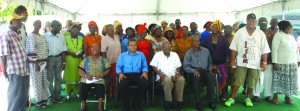
The Ministry of Culture, Youth and Sport on Wednesday presented cheques amounting to Gy$8.125M to 89 African cultural groups to assist them to effectively carry out their various activities for Emancipation celebrations to be observed on August 1.
Since 2005, Government has been supporting Emancipation activities, starting with just three groups, and has been encouraging persons from various backgrounds to become involved in preserving their cultural activities, the Government Information Agency (GINA) reported.
Emancipation day is marked as an important day, not only in the Guyanese calendar, but also the global perspective. The inhumane system of slavery was abolished on August 1, 1834 in all British colonies including British Guiana-now Guyana.
Pernicious system
It brought an end to the pernicious system of slavery which for centuries had brought pain, suffering and bitterness.
Minister of Culture, Youth and Sport Dr. Frank Anthony prior to handing over the cheques, pointed out that as Guyanese celebrate another Emancipation anniversary, they reflect on the country’s history.
He reminded the audience that the village of Buxton on the East Coast of Demerara was named after Thomas Buxton, who had advocated the Emancipation Acts of 1833 in the British House of Commons.
Sacrifice
“When we think about sacrifice, when we think about what people had to endure, the conditions under which they were living, I think that it is important that we read some of the documents of that time,” Minister Anthony urged.
“When we talk about slavery as a people we must understand the horrific system it was,” he stated.
Highlighting some of the difficulties the slaves endured on the sugar plantations, including women and children, he said that “we need to understand the difficulties of slavery so that when we talk about it we must understand what a horrific system it was.
“It’s not just about understanding, it’s about knowing that we don’t have things like these being repeated anywhere in the world because it’s about dehumanising us, and we must use these bad examples to make sure they never recur,” Minister Anthony emphasised.
Reparations
According to the Minister, one of the things that persons must understand around the Caribbean is that there has been a call for reparations and there is a Caribbean Commission that has been established and has been working to talk to the colonial powers of the past and present.
The Museum of African Heritage has also been archiving documents and artifacts of the country’s history which will be showcased to other countries whose people were also victims of slavery.



